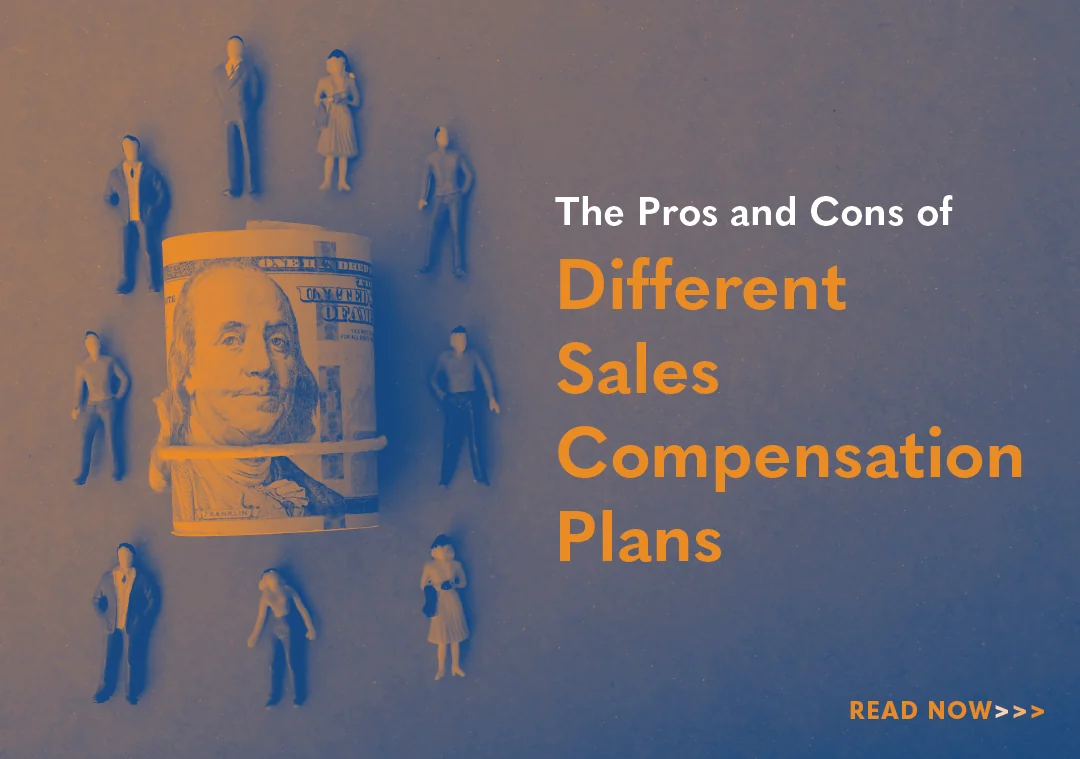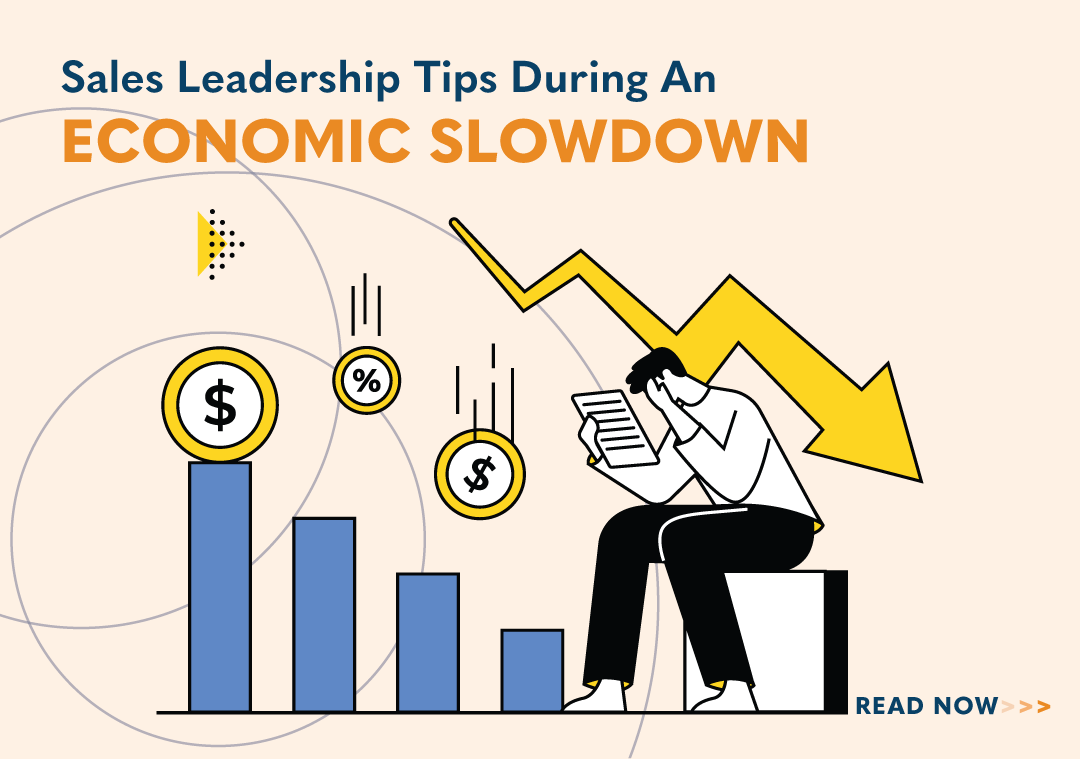The Pros and Cons of Different Sales Compensation Plans

With any job, a primary consideration is compensation. We all want to be paid fairly. One common perk of a career in sales is the ability to earn more based on your own hard work and selling success. With salary, commission, bonuses, and other incentives, sales professionals often have options and feel in control of the compensation they receive, which can be great for motivation and fulfillment. However, the types of sales compensation plans can be more complex than for other professions. Not all plans fit all salespeople. Below, we’ll explore the advantages and disadvantages of some of the most widely used compensation plans for sales professionals.
Salary Only Sales Plan
Without question, this is the easiest type of compensation for both sales reps and their organizations to manage. On the positive side, consider the following benefits:
- A salary-only compensation plan offers security for the employee and dramatically simplifies things for the employer.
- It can also foster a more collaborative and supportive team environment since there is no direct competition based on individual sales performance.
- With no variable costs, payroll expenses are easy to forecast and budget for.
- In some instances, salary-only sales can be positioned as a more “transparent” marketing differentiator. This might give customers the impression of a low- or no-pressure sale.
- It can also encourage sales representatives to prioritize ethical selling practices over aggressive tactics which are often applied to meet short-term targets.
However, this type of plan does have drawbacks:
- For one thing, there is less earning potential. Working regular hours, sales reps earn the same regardless of their work. As a result, there can be reduced incentive to work harder or produce more.
- Also, it can be more challenging to tie performance to goals. Without the incentive of commission or performance-based bonuses, salespeople may lack the motivation to go above and beyond in driving sales results. Sales managers will have to think of nonmonetary alternatives as motivators.
- A salary-only plan might not align as closely with the company’s revenue goals, as there’s no direct correlation between sales success and compensation.
- Finally, individual sellers who are highly motivated by financial incentives may be less inclined to join a company with a salary-only structure, potentially limiting the talent pool.
Commission Only Sales Plan
In theory, this type of compensation can be the most attractive for highly motivated reps because it offers several benefits that should directly appeal to them:
- First and foremost is high earning potential. When a sales rep’s pay is directly tied to the deals they close, many will be extra motivated to identify the best targets, make the extra calls, and work longer hours to get things done.
- Another benefit for sales reps is control. With commission-based compensation, reps earn based on what they sell. If they sell more, they earn more. In addition to the motivation, this appeals to extra-confident risk-takers who will think outside the box to find innovative solutions.
- A commission-only structure can be cost-effective for organizations as they only pay for actual sales generated. This model aligns the financial health of the sales team with the success of the business.
However, this too can present challenges for both reps and the organization:
- For example, a commission-only plan offers less security, making it risky for employees. Even the best reps can sometimes suffer from slumps or market changes beyond their control. These things can adversely affect their earning potential.
- In addition, commission-only compensation can result in higher turnover. Those sales reps who do not excel will leave when they can’t produce the income they need. As a result, employers should consider the increased onboarding costs associated with this type of plan.
- A further consequence of a commission-only plan is that it might trigger unwanted behavior to satisfy short-term goals that can cause irreparable damage to the brand.
- In addition, a make-or-break, commission-only comp plan increases the likelihood of a hostile work environment with little to no teamwork. If a sales rep’s entire compensation is directly tied to their individual effort, they could compete against each other for prospects or territories. As a result, the organization may lose the benefits of a united and collaborative sales team.
Base Salary Plus Commission Sales Plan

In many ways, this is the happy medium between salaried and commission plans:
- A common salary-to-commission ratio is 60:40 (60 percent fixed / 40 percent variable). This offers the security of a salary with the greater earning potential of commission. The hybrid structure aligns the interests of sales representatives with those of the company.
- The base salary can act as a buffer, allowing salespeople to weather uncertainties while still having the motivation to pursue commission-based opportunities.
While there are no real downsides to this type of plan, organizations should be mindful of several things:
- This requires a solution that benefits both employee and employer. As a result, it should be frequently revisited as market conditions change, making it work-intensive for employers.
- Base Salary Plus Commission plans need to be kept simple. If a plan grows too complex and elaborate, it can lead to a discouraged sales force, costly accounting errors, and complex administrative burdens.
- Also, this plan must be tied to company objectives and not prompt behavior that benefits only the sales rep, not the company.
Performance- or Goal-Based Commission Sales Plan
This plan pays reps when they reach specific goals, targets, or milestones in which output and activities are directly tied to their pay. It offers the following benefits:
- This is the ideal plan in situations when you’re trying to drive client growth, increase upsells, or boost cross-selling opportunities.
- Pay increases as deals are closed or benchmarks achieved. For example, a salesperson is paid $200 for every new customer and $300 for renewing an existing contract. This eliminates the intimidation of a hard quota.
- The emphasis is less on revenue and more on driving desired behaviors, activities, and outcomes.
However, a plan like this can have negative consequences:
- Sales reps with different titles and priorities may feel shortchanged compared to peers who chase fewer or easier short-term targets.
- You may run the risk that sales reps lose sight of your organization’s overall mission.
- The sales organization also focuses more on achieving immediate goals rather than building long-term customer relationships or engaging in activities that contribute to sustained business growth.
Team-Based Sales Plans
With these plans, teams work together within territories of prospects and clients. On the plus side:
- Once the pay period is complete, the commission is split between reps.
- This can be great for developing a team atmosphere because such a plan motivates team members to support each other, share best practices, and collectively strive for success. The emphasis is on achieving team goals and fostering a sense of unity and camaraderie.
- Team-based commission plans often strike a balance between individual and collective success. While team performance is crucial, individual contributions are still recognized.
However, on the downside:
- The success of team-based plans relies heavily on positive team dynamics. If there’s tension or lack of collaboration within the team, the effectiveness of the plan may be compromised.
- While this creates collaboration, it can also create animosity if some sales reps think they work harder than their peers.
- It can also be difficult for sales managers to measure and quantify individual contributions within a team.
Gross-Margin or Profit-Based Commission Sales Plan

A slightly more complicated plan that considers the true profitability of an organization. It takes into account the expenses it took to close a deal. For example, Sales Rep Jane closes a deal for $10,000, but it took around $2,000 in expenses. In this case, Jane only gets a commission for the difference ($8,000). First. the pluses:
- The advantage for the organization is obvious—it shifts focus from revenue to profit, which is a more straightforward indicator for a business.
- This strategy is often employed to reduce discounting that may hurt the company’s bottom line.
- Salespeople may adopt a more strategic approach to selling, focusing on value propositions, upselling, and cross-selling strategies that enhance profit margins.
On the downside:
- Sometimes, avoiding expenses (even discounting) can make selling a lot more challenging and possibly put your organization at a competitive disadvantage.
- Determining profit margins and calculating commissions based on these margins can be more complex than a traditional revenue-based commission structure. It may require accurate tracking of costs, discounts, and other factors influencing profitability. This also may lead to disputes or misunderstandings between the sales rep and leadership, especially if there’s ambiguity or lack of transparency in how profit margins are determined.
Residual Sales Commission Plan
Residual sales commissions, also known as recurring commission, is a type of compensation structure in which sales representatives earn commissions on an ongoing basis for sales they have made in the past. This model is particularly common in industries where products or services involve recurring payments, subscriptions, or renewals, such as SaaS companies or consultancy firms. Here are some key advantages:
- This commission model encourages sales representatives to focus on building and maintaining long-term relationships with clients. The emphasis is on customer retention and satisfaction to ensure continued revenue streams.
- They provide salespeople with a degree of income predictability and stability, as they continue to earn commissions over time from existing customers in addition to pursuing new business opportunities.
- The commission structure aligns with the concept of customer lifetime value, recognizing the ongoing revenue potential associated with each customer beyond the initial sales.
Here are some considerations for organizations wanting to deploy residual sales commission plans:
- Calculating commissions for residual income can be complex, especially if there are various pricing tiers, discounts, or changes to subscription plans over time. Ensuring accurate and transparent calculations is essential to avoid disputes.
- Sales representatives may become less motivated to pursue new business if they are earning substantial residual commissions from existing customers. This can affect efforts to expand the customer base.
- Earnings from residual commissions often accumulate over time, leading to a delayed realization of income for new sales reps. This delay can be a disadvantage for those who prefer more immediate rewards for their efforts.
As all sellers know, there is no one-size-fits-all sales approach that works for all sales teams. Instead, there are best practices successful organizations employ to drive results. What works for one organization may not be right for another. In this way, it is incumbent on sales leaders to understand the environment and culture they wish to foster and develop a compensation plan that works for the long-term goals and objectives of their reps and organization.
How To Design a Successful Compensation Plan For Your Sales Team

Looking to design a sales compensation plan? Make sure you follow these best practices.
Align compensation with overall business strategy
A well-formulated business plan should clearly indicate where the company wants to go and how its leadership is going to achieve progress and attain desired business outcomes. Set up your compensation plan to support and advance the company’s strategic and financial goals. Map out a specific course of action to optimize results and achieve maximum success within established time constraints. Also, make sure your sales reps are on board with your business goals and know exactly how their efforts will spur the organization’s growth.
Each sales executive should address the following questions:
- What steps do I need to take to move the organization forward?
- What is our target revenue?
- How long should it take to get to that level?
- What is the best way to attract more business, revive old leads or increase sales for existing customers?
In addition to sales quotas, you may introduce additional metrics to evaluate performance and assess each sales person. Set realistic targets and avoid putting undue stress on your sales reps while at the same time, challenge them to upgrade their approach, enhance their skills and constantly strive for bigger, better and more impressive results.
If you take it further and offer increased commissions for over-achievement, the results may surprise you. The better the sales person does in exceeding his/her initial goals, the higher the payout percentage should be.
If your company continues to evolve and your business goals change overtime, you should regularly upgrade, revise and modify your compensation plan and make it more appealing to your existing and new sales reps.
Make it easy to understand and execute
Make a point of regularly reviewing your compensation package. Make it as clear as possible, eliminate potential loopholes and discrepancies, and avoid vague language. Intricate performance measures may create a lot of confusion and discontent among your sales reps. Additionally, sales managers should take the time to explain all the aspects of the compensation program and make sure that every sales person fully understands the system, how it works, how it is going to benefit them, and how they can get the most of it. If necessary, schedule a one-on-one session with each member of your sales team and address all the questions and concerns that may arise during your conversation.
Your sales compensation plan should be written, documented and distributed among your sales reps. It should outline your short-term and long-term goals, detail all the benchmarks, performance measures and payout formulas, and indicate what your top priorities are in terms of sales performance, sales results and customer service.
What Not To Do

Avoid lowering your compensation in a down economy.
Keeping great talent is cheaper than finding it. Even if market conditions continue to deteriorate, suppress the urge to save money and trim down your compensation package. The reason is simple. The cost of losing top sales people typically outweighs potential savings. Besides, top producers usually know other sales superstars, and in business the word gets around fast. If you start revising and reducing your compensation packages as soon the going gets tough, your reputation will suffer and you will struggle to regain your momentum, win trust, and attract top talent in the future.
Don’t just focus on dollars and returns.
There are non-monetary benefits that may inspire your sales people to exceed expectations and bring even more value to their team. Even small gestures of appreciation (i.e. movie tickets, gift cards, weekend trips and dinner invitations) can lead to a higher level of job satisfaction and improved morale, and ultimately result in positive cash flow.
While financial compensation is important, some sales professionals place a high value on professional growth and would appreciate ongoing training sessions, continuing education, sales coaching, computer courses and other incentives that would help them polish their skills, stimulate their minds and advance their careers.
Furthermore, if you explain to your sales candidates that you have all the crucial tools they need to succeed (i.e. the latest technology, effective CRM system, ongoing coaching and support, powerful and well-developed marketing engine to attract new business, etc.), they are more likely to join your team and stay for the long haul.
Avoid making changes without consulting your sales reps first.
There may be good reasons to make changes to your compensation plan. Perhaps a change in revenue requires a change in the compensation structure. Maybe there’s a new owner who wants to explore alternative ways of designing compensation.But don’t unilaterally impose changes without having a conversation with your sales team first. Representatives may have useful ideas about how to shift compensation and even if they don’t, taking into consideration your team’s desires, wishes, and motivations can pave the way for a new compensation plan that works for everyone – even in those cases where hard choices have to be made and compensation has to temporarily be cut.
Avoid complicated compensation plans.
We’ve seen some compensation plans that practically require a mathematics or economics doctorate – stuffed with so many variables: accelerators, decelerators, clawbacks, tiered commission structures, gradients based on experience, the position of the constellations and Mercury in the House of Jupiter (okay, the last is a joke) – that sales reps are confused and don’t understand how much they’re making or why.A confused sales team is inefficient at best. Keep it simple so that your reps can focus on what they do best: getting qualified clients and closing deals.
How to Change Compensation Plans?

Organizations change and so do priorities. In light of this, corporate leadership should think about restructuring the sales plan yearly to reflect the company’s shifting goals. Each year, organizational aims and priorities should be clearly defined for the sales team so that they know what to focus on. For example, should the emphasis be on…
- Revenue, or gross margin?
- Growing existing customer accounts, or bringing in fresh accounts?
When drawing up your SCP, make sure it addresses these essential questions:
- What is our timeline for paying out incentives? Monthly? Quarterly? Annually?
- Should we pay salary plus bonuses, or go with a commission-only model?
- If commission-only, should we provide a draw?
- Should any portion of the sales compensation be tied to the organization? To the team?
- At what point is a sale recognized?
- When are payouts made?
SCPs should be carefully constructed and openly discussed with all team members. All applicable provisions (e.g., split sales, new hires, resignations, terminations, etc.) need to be clarified in the plan document. Your plan doesn’t need to be pretty—it shouldn’t be a hot mess either—it just needs to answer any questions salespeople may have and set the team on the path that ends up at the destination called Success.
Activities to Track
Salary and comp plans for SDRs and BDRs are often structured to reward activity above all else. Some examples of lagging and leading activity KPIs that can contribute to the comp plan include:
Efficiency and number of prospects engaged, via:
- Calls
- Emails
Effectiveness, such as:
- Meetings scheduled
- Meetings completed
- Pipeline generated/Opportunities created
Change Management for New Sales Compensation Plans
It’s one of life’s realities that people are creatures of habit. Even the most ardent adrenaline seekers who thrive on variety and things constantly shifting crave stability in things like a sales compensation plan. Therefore when changes come into play, there’s a high likelihood of a confused and skeptical sales force as everyone scrambles to calculate how they’re going to personally do under this new structure.
With a change management plan in place, you can ensure as smooth a process as possible when introducing a new sales compensation plan – it will be an adjustment that everyone understands and can see the logic of, and they’ll be well prepared to adapt to the new reality.
Or, to put it another way, without a change management process carefully plotted out ahead of time, a new compensation plan can be a very dangerous time for a company. Even those sales reps who stand to benefit significantly from the change can become unnerved and confused by the shift and those who see the change negatively might end up leaving the organization for an employer who offers an easier-to-understand (or similar to the old way) compensation plan. And we all know how expensive sales rep turnover can be.
So having a change management strategy before the switch occurs can keep everyone clear and focused, reduce disruption, and drastically reduce the probability of turnover occurring.
Ready to Boost Sales? Schedule Your Custom Compensation Consultation Now
Ready to revolutionize your sales strategy? Dive into the world of optimized compensation plans with us. Sales compensation isn’t just about numbers; it’s about driving behaviors and motivation. Our team specializes in evaluating, recommending, and implementing sales compensation plans that perfectly align with your policies, objectives, and goals. From commissions to bonuses and incentives, we’ve got you covered. Schedule your consultation now to supercharge your sales team’s performance.
Editor’s Note: This article, first published in June 2021, was revised to improve its clarity and relevance.

- Account Planning (12)
- Awards (44)
- Client Testimonial (37)
- Personal Branding (21)
- Podcast (12)
- Research (78)
- Sales Career Development (90)
- Sales Coaching (166)
- Sales Consulting (141)
- Sales Culture (180)
- Sales Enablement (382)
- Sales Leadership (116)
- Sales Management (267)
- Sales Negotiation (14)
- Sales Prospecting (138)
- Sales Role-Playing (19)
- Sales Training (243)
- Selling Strategies (281)
- Soft Skills (78)
- Talent Management (101)
- Trusted Advisor (29)
- Virtual Selling (57)
- Webinar (13)

























